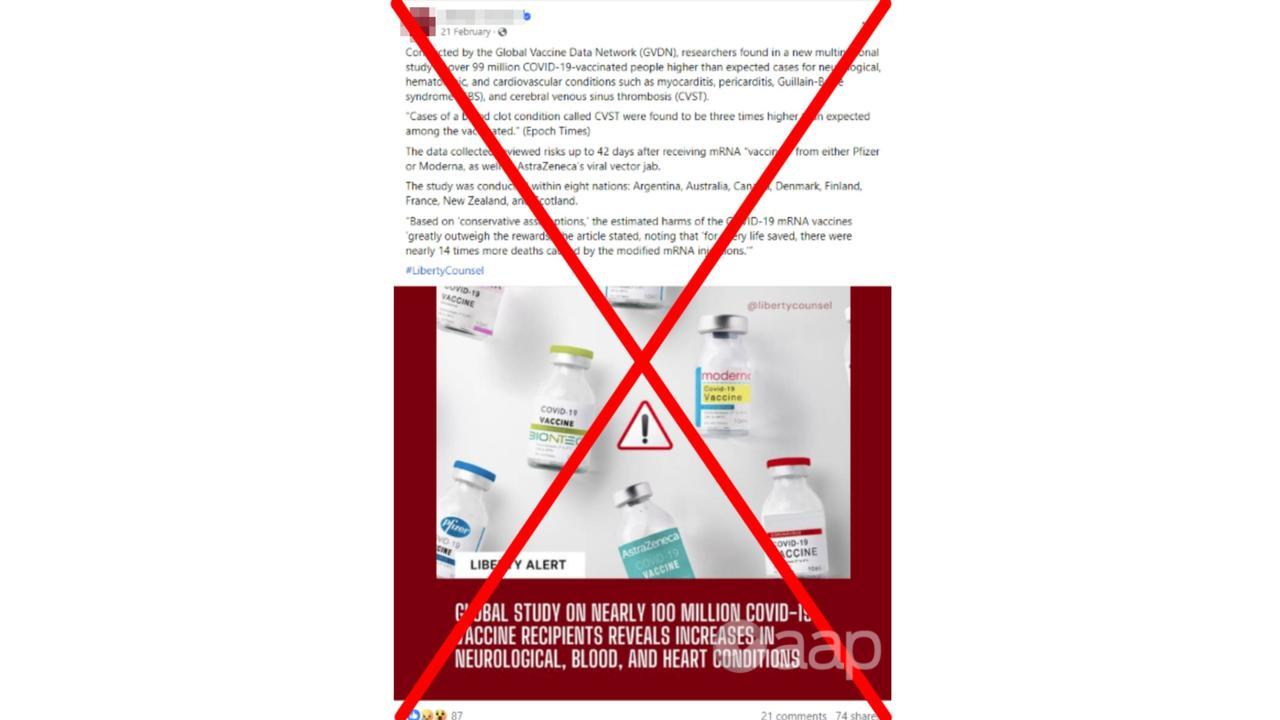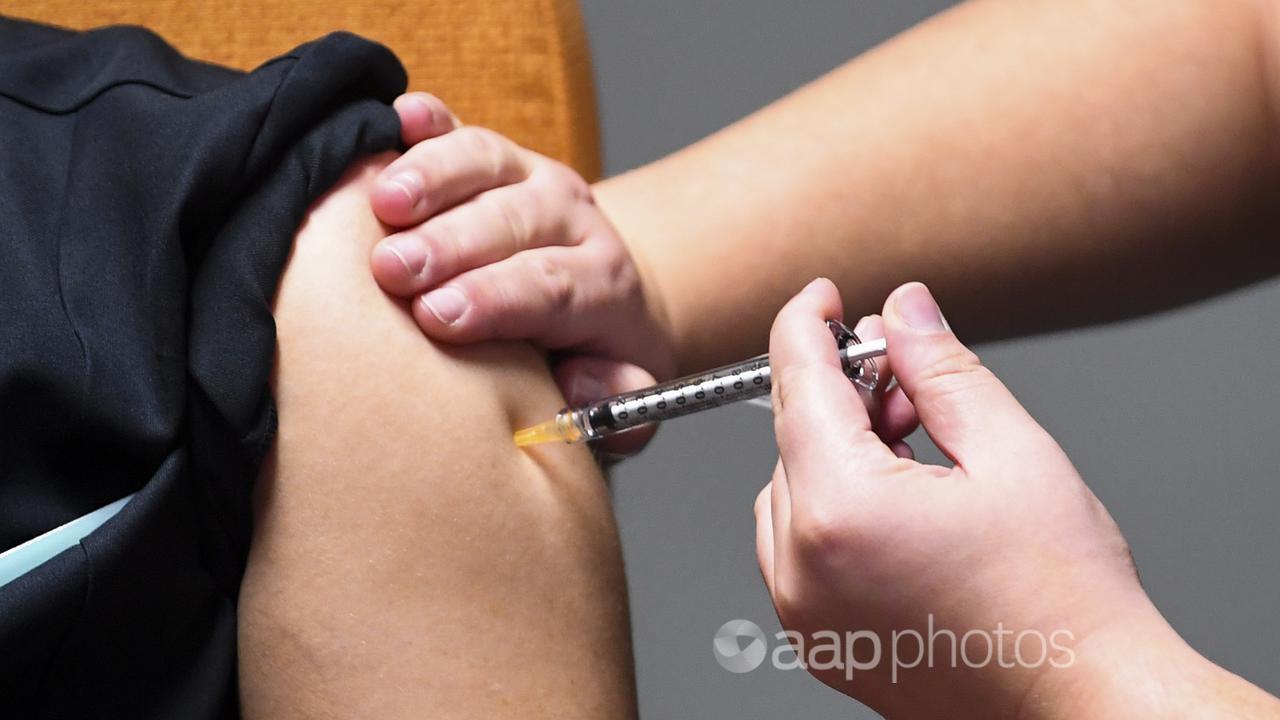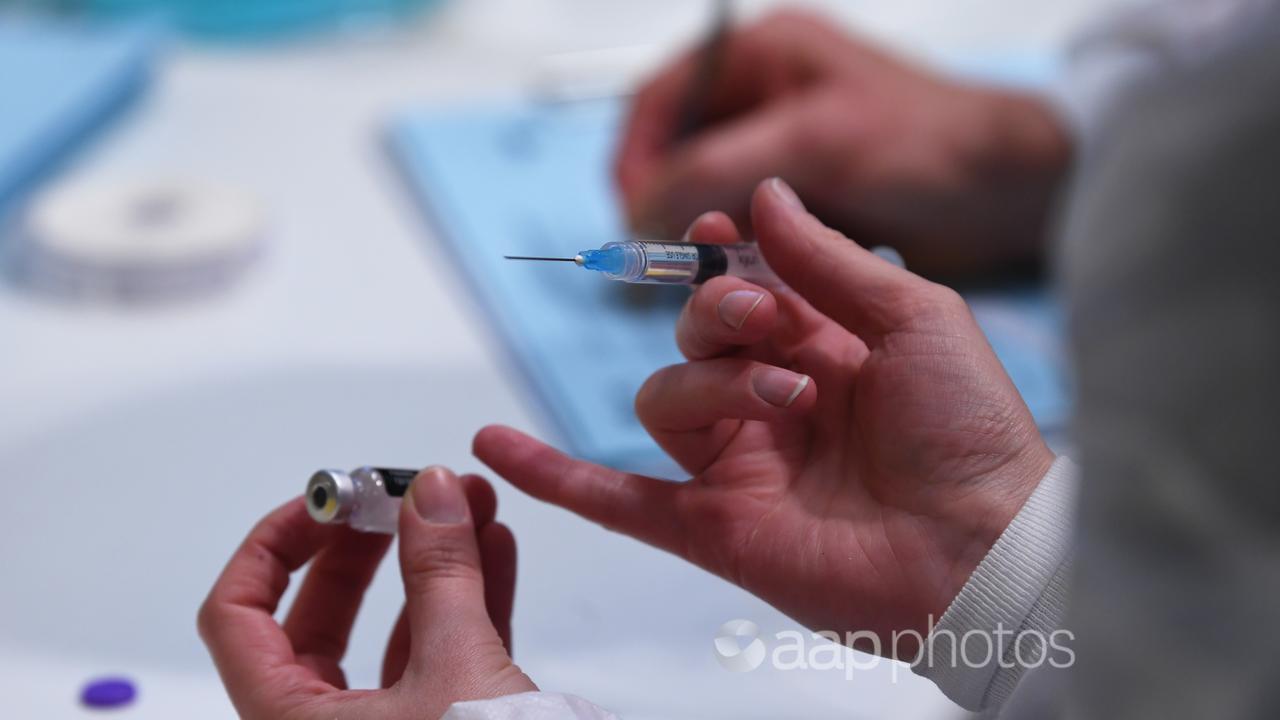The publication of the world’s largest COVID-19 vaccine safety study has prompted a deluge of misinformation on social media.
There are claims the study proves a link between the COVID vaccines and neurological disorders, and that it concludes that the harms from vaccination outweigh the potential benefits.
But the claims are false with one of the study’s authors telling AAP FactCheck their findings were being misused.
The study, published in February 2024, analysed reports of adverse events from nearly 100 million vaccinated individuals across eight countries, including Australia and New Zealand.
Notably, it compared the rates of 13 brain, blood and heart conditions to the expected rates before the pandemic.
The results were analysed to identify “safety signals” that could warrant further investigation to establish any link with the vaccines.

Among its findings, the Global Vaccine Data Network (GVDN) study confirmed the pre-established safety signals for myocarditis, pericarditis, Guillain-Barré syndrome, and thrombosis.
It also raised potential safety signals for the neurological conditions acute disseminated encephalomyelitis and transverse myelitis among some of the vaccines.
However, social media reports of the study stray to varying extents from the findings.
One notable claim is that the study concluded the harms associated with the vaccine “greatly outweigh the rewards”.
The claim is made in widely shared Facebook and Instagram posts, here and here.
The posts introduce the GVDN study and then state: “Based on ‘conservative assumptions,’ the estimated harms of the COVID-19 mRNA vaccines ‘greatly outweigh the rewards,’ the article stated, noting that ‘for every life saved, there were nearly 14 times more deaths caused by the modified mRNA injections.'”
There is no such finding in the study.
In fact, the final paragraph of the study’s “discussion” section says the opposite.
Referencing the “risk–benefit evaluations of vaccination” it states “multiple studies” have demonstrated higher risk of developing the likes of myocarditis and Guillain-Barré syndrome following COVID infection than vaccination.
GVDN co-director Professor Jim Buttery, one of the study’s authors, also said the claim was false.
“No, the study does NOT say that,” he said in an email to AAP FactCheck. “The study simply demonstrates very large datasets can detect rare safety signals that justify further investigation.
“Other studies have clearly shown the benefits of the ChAdOx1 (AstraZeneca) vaccine and mRNA vaccines significantly outweighed the risks.”
The supposed findings from the social media posts have actually been taken from another study, previously covered by AAP FactCheck in March 2024.
That study was found to contain numerous falsehoods and was retracted by the journal in which it was published.

Another common claim made in several posts is that the study definitively links acute disseminated encephalomyelitis (ADEM) and transverse myelitis (TM) to the vaccines, examples here and here.
This is mostly false. Safety signals were only raised for ADEM following the first dose of the ChAdOx1 and Moderna mRNA vaccines. For TM, it was just after the first dose of ChAdOx1.
There were no safety signals for the Pfizer COVID vaccine for either condition.
Regardless, Prof Buttery said the observed expected “signal detection” designed study did not prove causation.
“Essentially, the observed expected (OE) signal detection design is to tell us ‘Houston, there might be a problem’.
“There are many possible alternative explanations for such a signal, including COVID infection itself triggering episodes, and we need a different study design to help investigate.”

Given the findings, Prof Buttery said a further study was conducted with a “self controlled case series” (SCCS) design.
He said such a design helps to control many of the factors that could be responsible for the outcome.
“The SCCS design is to tell us ‘Houston, we think there is a problem’ and also to tell us how big the risk is (in this case extremely small, but of an important medical condition).”
The study analysed the data of 6.7 million vaccinated Australians and found a small increase in absolute risk of ADEM (0.78 per million doses) and TM (1.82 per million doses) following vaccination with ChAdOx1.
“No associations were observed between mRNA COVID-19 vaccines and ADEM or TM,” the study concluded.
While even this study does not prove causation, Prof Buttery said similar findings about the ChAdOx1 vaccine from an English study increased the probability.
He added: “The benefits of the ChAdOx1 vaccine and mRNA vaccines significantly outweighed the risks.
“The ChAdOx1 vaccine has been a lifesaving vaccine and the platform will be used for other vaccines, so understanding its risks and benefits remains important”
The Verdict
The claim that a multinational study of nearly 100 million COVID-19-vaccinated individuals concluded the harms of vaccination greatly outweigh the benefits is false.
The study looked at rare safety signals that may justify further investigation. It does not conclude that the harms outweigh the benefits.
The quoted claim comes from a different, redacted study which has been found to contain numerous falsehoods.
False – The claim is inaccurate.
AAP FactCheck is an accredited member of the International Fact-Checking Network. To keep up with our latest fact checks, follow us on Facebook, Twitter and Instagram.
All information, text and images included on the AAP Websites is for personal use only and may not be re-written, copied, re-sold or re-distributed, framed, linked, shared onto social media or otherwise used whether for compensation of any kind or not, unless you have the prior written permission of AAP. For more information, please refer to our standard terms and conditions.


















